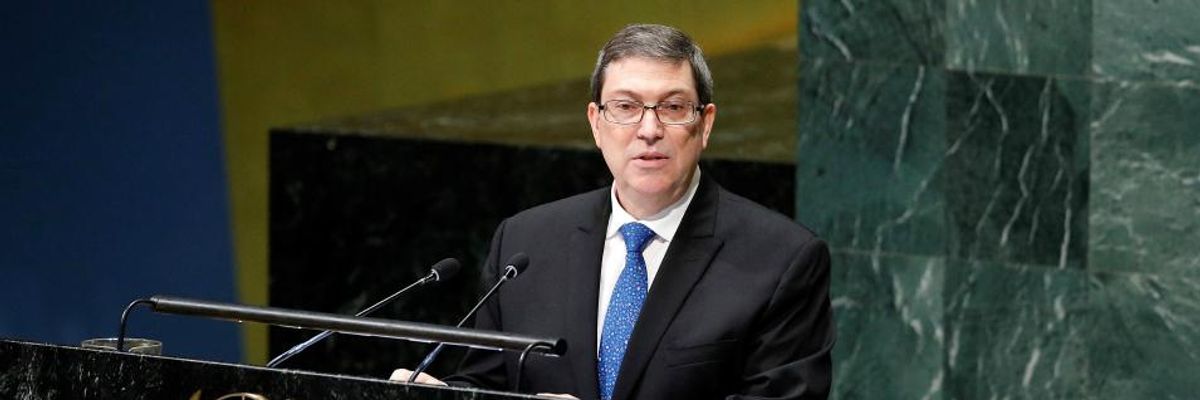

SUBSCRIBE TO OUR FREE NEWSLETTER
Daily news & progressive opinion—funded by the people, not the corporations—delivered straight to your inbox.
5
#000000
#FFFFFF
To donate by check, phone, or other method, see our More Ways to Give page.


Daily news & progressive opinion—funded by the people, not the corporations—delivered straight to your inbox.

Cuban Foreign Minister Bruno Rodriguez Parrilla speaks at United Nations General Assembly in New York on November 1, 2018. (Photo: Atilgan Ozdil/Anadolu Agency/Getty Images)
The United Nations General Assembly on Thursday voted for the 28th consecutive year to adopt a resolution condemning the six-decade U.S. economic embargo that has strangled Cuba's economy and caused widespread human suffering.
The final vote was 187-3, with Israel and Brazil joining the U.S. as the only nations opposed to the resolution. Colombia and Ukraine abstained and Moldova did not vote.
Bruno Rodriguez, Cuba's foreign minister, told the General Assembly following the vote that the Trump administration has "aggressively intensified" the devastating embargo, which he said "qualifies as an act of genocide." The Obama administration took steps to alleviate the embargo and normalize U.S.-Cuba relations, but the Trump White House has reversed course and imposed punishing new sanctions.
"The blockade has caused incalculable humanitarian damages. It is a flagrant, massive, and systematic violation of human rights," said Rodriguez. "There is not one single Cuban family that has not suffered the consequences of this."
\u201cOn Thursday the United Nations General Assembly passed a resolution condemning and calling for an end to Washington's economic embargo on Cuba.\u201d— ANews (@ANews) 1573219657
Keisha McGuire, Grenada's ambassador to the U.N., echoed Rodriguez's condemnation of the blockade and noted that Cuba was one of the first nations to assist The Bahamas after Hurricane Dorian struck in September.
"We view the embargo not just as a punitive act against Cuba, but as an impediment to our shared regional development," McGuire told the General Assembly. "Opposition to this policy is now almost universal in nature."
Trump and Musk are on an unconstitutional rampage, aiming for virtually every corner of the federal government. These two right-wing billionaires are targeting nurses, scientists, teachers, daycare providers, judges, veterans, air traffic controllers, and nuclear safety inspectors. No one is safe. The food stamps program, Social Security, Medicare, and Medicaid are next. It’s an unprecedented disaster and a five-alarm fire, but there will be a reckoning. The people did not vote for this. The American people do not want this dystopian hellscape that hides behind claims of “efficiency.” Still, in reality, it is all a giveaway to corporate interests and the libertarian dreams of far-right oligarchs like Musk. Common Dreams is playing a vital role by reporting day and night on this orgy of corruption and greed, as well as what everyday people can do to organize and fight back. As a people-powered nonprofit news outlet, we cover issues the corporate media never will, but we can only continue with our readers’ support. |
The United Nations General Assembly on Thursday voted for the 28th consecutive year to adopt a resolution condemning the six-decade U.S. economic embargo that has strangled Cuba's economy and caused widespread human suffering.
The final vote was 187-3, with Israel and Brazil joining the U.S. as the only nations opposed to the resolution. Colombia and Ukraine abstained and Moldova did not vote.
Bruno Rodriguez, Cuba's foreign minister, told the General Assembly following the vote that the Trump administration has "aggressively intensified" the devastating embargo, which he said "qualifies as an act of genocide." The Obama administration took steps to alleviate the embargo and normalize U.S.-Cuba relations, but the Trump White House has reversed course and imposed punishing new sanctions.
"The blockade has caused incalculable humanitarian damages. It is a flagrant, massive, and systematic violation of human rights," said Rodriguez. "There is not one single Cuban family that has not suffered the consequences of this."
\u201cOn Thursday the United Nations General Assembly passed a resolution condemning and calling for an end to Washington's economic embargo on Cuba.\u201d— ANews (@ANews) 1573219657
Keisha McGuire, Grenada's ambassador to the U.N., echoed Rodriguez's condemnation of the blockade and noted that Cuba was one of the first nations to assist The Bahamas after Hurricane Dorian struck in September.
"We view the embargo not just as a punitive act against Cuba, but as an impediment to our shared regional development," McGuire told the General Assembly. "Opposition to this policy is now almost universal in nature."
The United Nations General Assembly on Thursday voted for the 28th consecutive year to adopt a resolution condemning the six-decade U.S. economic embargo that has strangled Cuba's economy and caused widespread human suffering.
The final vote was 187-3, with Israel and Brazil joining the U.S. as the only nations opposed to the resolution. Colombia and Ukraine abstained and Moldova did not vote.
Bruno Rodriguez, Cuba's foreign minister, told the General Assembly following the vote that the Trump administration has "aggressively intensified" the devastating embargo, which he said "qualifies as an act of genocide." The Obama administration took steps to alleviate the embargo and normalize U.S.-Cuba relations, but the Trump White House has reversed course and imposed punishing new sanctions.
"The blockade has caused incalculable humanitarian damages. It is a flagrant, massive, and systematic violation of human rights," said Rodriguez. "There is not one single Cuban family that has not suffered the consequences of this."
\u201cOn Thursday the United Nations General Assembly passed a resolution condemning and calling for an end to Washington's economic embargo on Cuba.\u201d— ANews (@ANews) 1573219657
Keisha McGuire, Grenada's ambassador to the U.N., echoed Rodriguez's condemnation of the blockade and noted that Cuba was one of the first nations to assist The Bahamas after Hurricane Dorian struck in September.
"We view the embargo not just as a punitive act against Cuba, but as an impediment to our shared regional development," McGuire told the General Assembly. "Opposition to this policy is now almost universal in nature."